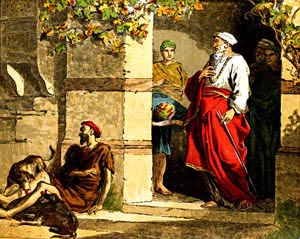XXVI SUNDAY IN ORDINARY TIME: Lk 16:19-31; Amos 6:1,4-7
The economic crisis
In the present situation of crisis in many European countries, this Sunday's readings leaves a very clear message: the luxury of the rich lived in complete ignorance of the suffering of the poor i sinful, and God will pass judgement on all those who abandon the poor to their suffering.
The luxurious life of the rich
The parable of the rich man and the poor Lazarus is an example of such situation. The rich man lived in great comfort and extravagance. He was so wealthy that he did not need to work, and could spend his days "feasting magnificently" (Lk 16:19). He was living on the work of others, and keeping the fruits of their work for himself. Leading a happy life, he could not imagine that his merriment would come to an end. He did not experience suffering, and so he could not sympathise with the suffering of others and feel compassion for their plight.
Amos’ diatribe against the rich
This kind of good life is described in Amos 6:4-7, which is given to us in the first reading of this Sunday’s liturgy:
"Alas for those who lie on beds of ivory,
and lounge on their couches,
and eat lambs from the flock,
and calves from the stall;
who sing idle songs to the sound of the harp,
and like David improvise on instruments of music;
who drink wine from bowls,
and anoint themselves with the finest oils,
but are not grieved over the ruin of Joseph!
Therefore they shall now be the first
to go into exile,
and the revelry of the loungers shall pass away."
The day of reckoning
Amos indicts the rich for their lack of compassion and sharing, totally oblivious of the the ruin and the suffering of the poor. However, the day of reckoning will come and they will "be the first to go into exile, and the revelry of the loungers shall pass away".
In the parable, the rich man's good life came to an end, and for the first time he experienced suffering as an unquenchable thirst for peace, joy and life. In that suffering he was alone, without anybody to minor his pain, as he had been alone in his revelry.
The wealth is to be shared
In times of deep economic crisis, the poor are the ones who suffer most. In a country in debt, the masses are the ones who lose jobs, while the rich manage to escape the painful measures that promise to restore the economy; and many times, they use the opportunity to increase their profits and their control of the economy.
We understand that investment is needed to create wealth, and investment is not possible without big capital, but many societies suffer from the greed of the rich, who own big assets, get huge salaries and receive handsome benefits, without the slightest concern for the poor. The burden is not shared, and the rewards are enjoyed by a few. There is a Bemba proverb that says: Umutembo ufinine konse konse, meaning the rod (for the carrying of a heavy load by two people) weighs equally. In a time of crises, the shoulders of the rich can and should carry heavier burdens than the poor.
The ability to share and to be compassionate is human and divine at the same time. "Be merciful, just as your Father is merciful" (Lk 6:36)

No comments:
Post a Comment